
Take a moment to imagine the following scene from the New Testament: Jesus has gathered His disciples around him in Capernaum after teaching in the synagogue. He has just fed the five thousand with two fish and five loaves of bread. He has walked on water in the midst of a storm. Prior to this, he has healed a man both physically and spiritually. He has turned water into wine, cleansed the temple, seen into the heart of a Samaritan woman as they sat at a well, and has time and again testified to his disciples who exactly He is.
He looks at this motley crew of disciples who have traveled so far with Him – among them a handful of fishermen, a tax collector, and at least one zealot, all of them likely younger than we tend to imagine. He sees them, knows them, and loves them. They have come far together, and are beloved friends. He has renamed at least three of them, giving Simon the surname of Peter, meaning rock, and giving James and John the not-so-subtle moniker of ‘the sons of Thunder.’
They have traveled together, they have eaten together, they have taught together.
There were probably a number of late nights and early mornings were a disciple was struck with a bout of insomnia, only to find their Master watching the skies or on his knees praying to His Father. Perhaps then Christ offered them sacred, loving, individual counsel (a literal come to Jesus).
He knew that Peter was impulsive and bold, that James and John were blunt, ambitious, and protective (remember that they wanted to call down fire from heaven to destroy the Samaritan village that refused their Master hospitality), that Andrew was the one who had invited his brother Peter to first learn from Christ, that Nathanael was honest and without guile, that Thomas, though he had his doubts, was the first to tell the Lord without hesitation that he would go with Him into the town of Bethany, even if it meant dying with Him.
At the end of the sixth chapter of John, we read that Christ had gathered these men and others He loved so dearly and “knew in himself that his disciples murmured” at some of the things he had preached on that hillside not long before. “There are some of you that believe not,” he tells them, because “Jesus knew from the beginning who they were that believed not, and who should betray him.”
The others who had tagged along departed, leaving Christ with his Twelve. He surveys these men, and asks, “will ye also go away?”
I can’t imagine how heartbreaking it must have been for Jesus Christ to pose that question. His voice likely held the same tenor then as it would some time later on the banks of the Galilee, when He asked Simon Peter thrice, “lovest thou me?”
I imagine there was a bit of a pause as the twelve looked at one another, and at their Master. Finally, Simon Peter responds,
“Lord, to whom shall we go? Thou hast the words of eternal life. And we believe and are sure that thou art that Christ, the son of the Living God.”
President Ballard, in his 2016 General Conference talk entitled “To Whom Shall We Go?” taught that “in that moment, when others focused on what they could not accept, the Apostles chose to focus on what they did believe and know, and as a result, they remained with Christ,” and notes that later, when they received the gift of the Holy Ghost on the day of Pentecost, that they became bolder in their witness of Christ as the Savior and Messiah, and that they understood more fully what they had been taught during the earthly ministry of Jesus Christ.
That question, “to whom shall we go?” is just as crucial to our discipleship as it was to that of the original Twelve apostles.
President Ballard continued, “Today is no different. For some, Christ’s invitation to believe and remain continues to be hard – or difficult to accept. Some disciples struggle to understand a specific Church policy or teaching. Others find concerns in our history or in the imperfections of some members and leaders, past and present. Still others find it difficult to live a religion that requires so much. Finally, some have become ‘weary in well-doing.’ For these and other reasons, some Church members vacillate in their faith, wondering if perhaps they should follow those who ‘went back, and walked no more’ with Jesus.”
I have asked myself that question countless times in the past years – to whom would I go, if I were not to continue beside Jesus? And while that question has thankfully never been answered by experience, I have learned much about who it is I have turned to, and continue to strive to walk alongside, and who I would be without Him and His restored Gospel in my life.
As I prayed about this idea and brought it to the temple, my mind was continually drawn back to whom it is we do turn to, in spite of our doubts, questions, and at times, our own rebellious nature, and why we make that choice to remain with him in the face of adversity.
In the course of our journey of discipleship, we will come across questions that will cause us to halt and take stock of what we believe.
Some are more obvious – the position of the Church on key political issues, the sacrifices required and obedience expected to hold a temple recommend, the history of the Church concerning members and events, the amount of time we are expected to spend in Church, in our callings, and in our activities.
Others are more personal, and often harder to tackle – the consequences of our mistakes and sins, how doctrine and principles impact our lives, and even the actions of other members can throw us into an inner turmoil that might cause us to feel that it would be best to “walk no more” with the Saints. What causes these doubts or concerns will shift and change as we do.
It’s Christ who will never change.
That Savior to whom we turn will not change, because of his infinite and eternal love for us. His very nature is unchanging and eternal. He is and will always be the one holding out a hand from the Garden and from the Cross, calling us to follow Him and accept His mercy and grace. He will always be the one to kneel beside us, weep with us, rejoice with us, and constantly call to us, intercede for us, and wait for us.
How we see Him might change – there are times in my life when I needed my Savior as a Comforter above all else, times when I needed that Captain of my soul as I navigated rough waters, days when I needed more of the Lion of Judah and less Shepherd, and there are other times when I needed Him to be more of a drill sergeant as I got my life in order.
(…So it was like five years of drill sergeant.)
President Ballard reminds us, “Brothers and Sisters, accepting and living the gospel of Christ can be challenging. It has always been thus, and it ever will be. Life can be like hikers ascending a steep and arduous trail. It is a natural and normal thing to occasionally pause on the path to catch our breath, to recalculate our bearings, and to reconsider our pace. Not everyone needs to pause on the path, but there is nothing wrong with doing so when your circumstances require. In fact, it can be a positive thing for those who take full advantage of the opportunity to refresh themselves with the living water of the gospel of Christ.
“The danger comes when someone chooses to wander away from the path that leads to the tree of life. Sometimes we can learn, study, and know, and sometimes we have to believe, trust, and hope.”
It isn’t easy to walk with Christ, to continue in our faithfulness, but then again, Christ never promised that it would be. He never promised us that after we rose up out of those waters of baptisms that our doubt would leave us. He never promised us that upon receiving the gift of the Holy Ghost that persecution would halt, that trials would cease, and that tribulation would be no more. He didn’t say we’d have all the answers, and that the questions wouldn’t knock us off our feet as we walked His path.
What He did promise us was that He’d be there. He denied no one, rather, He invited them to come and partake of His goodness, promising he’d be there when our questions arose, when our fears took hold of our hearts, when the world took up arms against us. When the apostles asked questions, He never snapped or pushed them aside. He spoke honestly and with great love, but with a boldness that allowed for His disciples to take stock of where they were at. Those questions were an opportunity for course correction and for a deeper understanding of doctrine, but also an opportunity for an increase of faith. He has never asked us to know everything, other than to believe in His love for us, knowing the rest would follow.
My favorite Conference address given by Elder Neil L. Andersen underscores this idea of not knowing anything, but yet believing and turning to Christ.
“Our spiritual journey is the process of a lifetime. We do not know everything in the beginning or even along the way. Our conversion comes step-by-step, line upon line. We first build a foundation of faith in the Lord Jesus Christ. We treasure the principles and ordinances of repentance, baptism, and receiving the gift of the Holy Ghost. We include a continuing commitment to prayer, a willingness to be obedient, and an ongoing witness of the Book of Mormon. (The Book of Mormon is powerful spiritual nourishment.)
We then remain steady and patient as we progress through mortality. At times, the Lord’s answer will be, “You don’t know everything, but you know enough”—enough to keep the commandments and to do what is right. Remember Nephi’s words: “I know that he loveth his children; nevertheless, I do not know the meaning of all things.””
It’s okay not to know the meaning of all things! But what we do need to know is whom it is we turn to.
After I joined the Church, there were several tumultuous years both personally and spiritually. I was a stubborn child in an interfaith home that became a rebellious teenager in a broken home. My parents got divorced just three years after my mom, sister, and I joined the Church, leaving me wondering how following the invitation to “come follow me” had resulted in a mess of a home, and being written off by a large part of my father’s side of the family. I had a lot of questions about my purpose and the doctrine of the Church, and how the Atonement applied to me. I went to university feeling like a second rate citizen compared to my classmates – I knew very little about the Book of Mormon other than I believed it was true, my family was a wreck, I was rough around the edges, and was unfamiliar with a great deal of the culture of the Church despite a loving home ward that did their best with a slightly wayward teenager. I battled personal demons, culture shock, and a 7AM biology class, and felt like the Lord had dumped me in dark and unfamiliar waters.
But it was there that I learned that the only way to get through it all was to turn to the Savior because He was the only one that was going to get me through it.
It was in those dark waters that I came to consciously and purposefully embrace the light and promise of Christ’s Atonement.
It was then that I learned that questions were crucial to my growth, but only if I asked the right person, and listened to the answers I received.
It was in my own late nights and early mornings that I found that healing and direction would come only by staying aboard the “old ship Zion,” not by jumping ship and trying to make it on my own as I tackled questions and doubts and fears.
Never once did the Savior brush aside my questions, no matter how trivial, but neither did He always calm the storm. He just promised He’d be aboard my little ship helping me navigate those storms. He knows me like He knew those original twelve apostles – knows my doubts and questions, but also my heart and faith. He doesn’t punish me for my doubts, but rather asks that I bring them to His feet, rather than to the boxing ring that is society. He knows were my weaknesses are, and knows how to turn them to strengths. He knows the path my feet tread, and that my stubborn streak is as long as a country mile, but He doesn’t give up on me. He weeps with me when I feel lost and broken, rejoices with me when my heart is filled with light and joy, and fights alongside me when I am called to the fray. He is there in the valley of shadows, and on that mountaintop.
So when the tides rise and the path grows steep, and your lamp flickers, to whom do you turn? When we are overwhelmed by our own lives, feeling half-drowned from our own sins and transgressions, feeling wounded and alone, to whom do you turn?
Each of us need to answer that question as we walk the path of discipleship, and it is likely that we will need to answer it again and again throughout our lives as we face different challenges and heartaches.
Years later, Simon Peter praised the Savior in the same vein He did when Christ asked whether He would walk no more with him, saying,
“Blessed be the God and Father of our Lord Jesus Christ, which according to his abundant mercy hath begotten us again unto a lively hope by the resurrection of Jesus Christ from the dead, to an inheritance incorruptible, and undefiled, and that fadeth not away, reserved in heaven for you, who are kept by the power of God through faith unto salvation… wherein ye greatly rejoice, though now for a season, if need be, ye are in heaviness through manifold temptations, that the trial of your faith, being much more precious than of gold that perisheth, though it be tried with fire, might be found unto praise and honor and glory at the appearing of Jesus Christ, whom having not seen, ye love, in whom, though now ye see him not, yet believing, ye rejoice with joy unspeakable and full of glory, receiving the end of your faith, even the salvation of your souls.” (1 Peter 1:3-9)
When those hard times come, those trials of our faith, do we turn to the Savior? Do we stand with Peter and proclaim Christ? Do we declare our faith?
Or do we turn away and walk no more with Him?
When the path grows steep, to whom do we turn?
{It’s also important to remember to walk with Christ when times are good, when the waves lap gently at our feet instead of dragging us out to sea. Are we the disciples who are with Christ every step of the way, or just when we are desperate and afraid?}
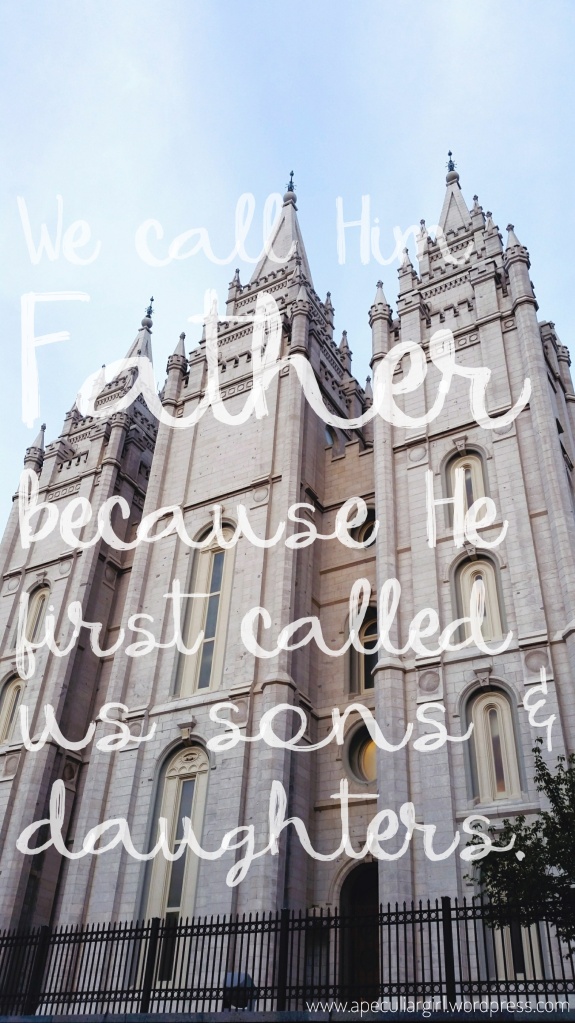
 ow to the education of the individual).
ow to the education of the individual).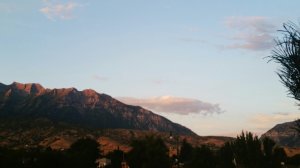
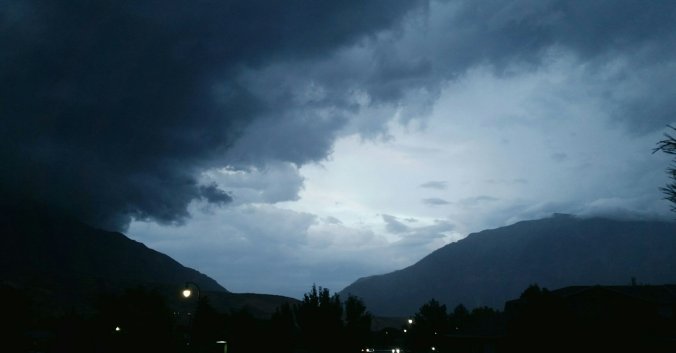
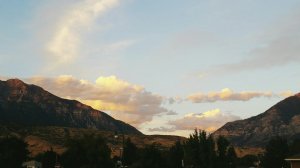
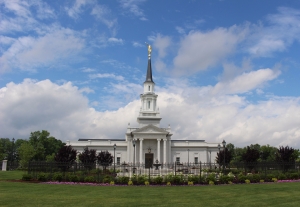
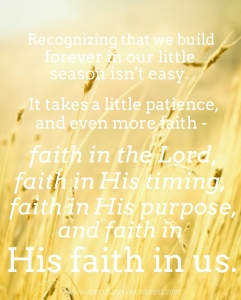 The work the Lord calls us to do for that little season is different for everyone – sometimes it’s work in a community or in a congregation, within a family, or even work within our own selves. Sometimes it’s easy and pleasurable, other times it is hard and full of sorrow. Most times, it’s a mixed hand. But that work for a season of sojourn always proves crucial in some way to our longer journey, to our bigger story, to the more eternal perspective. And not only for our own story, but for others as well. We don’t know how our little seasons coincide with the little seasons (or long seasons) of others.
The work the Lord calls us to do for that little season is different for everyone – sometimes it’s work in a community or in a congregation, within a family, or even work within our own selves. Sometimes it’s easy and pleasurable, other times it is hard and full of sorrow. Most times, it’s a mixed hand. But that work for a season of sojourn always proves crucial in some way to our longer journey, to our bigger story, to the more eternal perspective. And not only for our own story, but for others as well. We don’t know how our little seasons coincide with the little seasons (or long seasons) of others.